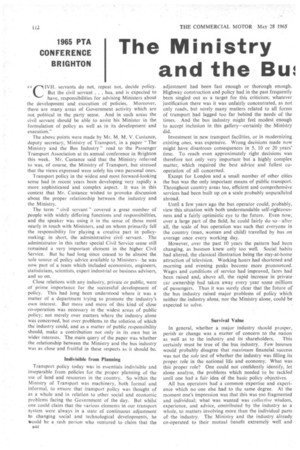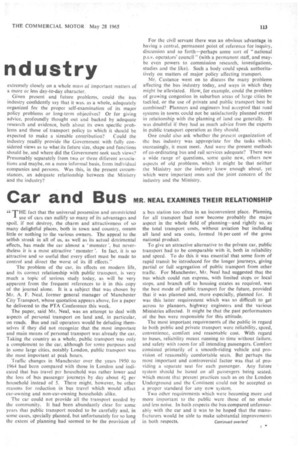1965 PTA CONFERENCE BRIGHTON
Page 114

Page 115

If you've noticed an error in this article please click here to report it so we can fix it.
The Ministry and the Bul ndustry
IV1L servants do not, repeat not, decide policy.
But the civil servant . . . has, and is expected to have, responsibilities for advising Ministers about the development and execution of policies. Moreover, there are many areas of Government activity which are not political in the party sense. And in such areas the civil servant should be able to assist his Minister in the formulation of policy as well as in its development and execution."
The above points were made by Mr. M. M. V. Custance, deputy secretary, Ministry of Transport, in a paper The Ministry and the Bus Industry" read to the Passenger Transport Association at its annual conference in Brighton this week. Mr. Custance said that the Ministry referred to was, of course, the Ministry of Transport, but stressed that the views expressed were solely his own personal ones.
Transport policy in the widest and most forward-looking sense had in recent years been developing very rapidly a more sophisticated and complex aspect. It was in this context that Mr. Custance wished to provoke discussion about the proper relationship between the industry and the Ministry.
The term "civil servant" covered a great number of people with widely differing functions and responsibilities, and the speaker was using it in the sense of those most nearly in touch with Ministers, and on whom primarily fell the responsibility for playing a creative part in policymaking: in short, the administrative civil servant. The administrator in this rather special Civil Service sense still remained a very important element in the higher Civil Service. But he had long since ceased to be almost the sole source of policy advice available to Ministers—he was now part of a team which included economists, engineers, statisticians, scientists, expert industrial or business adviSers, and so on.
Close relations with any industry, private or public, were of prime importance for the successful development of policy. This had long been understood where it was a matter of a department trying to promote the industry's own interest. But more and more of this kind of close co-operation was necessary in the widest areas of public policy; not merely over matters where the industry alone was concerned, but over problems to the solution of which the industry could, and as a matter of public responsibility should, make a contribution not only in its own but in wider interests. The main query of the paper was whether the relationship between the Ministry and the bus industry was as close and fruitful in these respects as it should be.
Indivisible from Planning Transport policy today was in essentials indivisible and inseparable from policies for the proper planning of the use of land and resources in the country. So within the Ministry of Transport was machinery, both formal and informal, to ensure that transport policy was thought of as a whole and in relation to other social and economic problems facing the Government of the day. But whilst one could claim that the various elements in our transport system were always in a state of continuous adjustment to changing social and technological developments, he would be a rash person who ventured to claim that the
B44
adjustment had been fast enough or thorough enough. Highway construction and policy had in the past frequently been singled out as a target for this criticism; whatever justification there was it was unfairly concentrated, as not only roads, but surely many matters related to all forms of transport had lagged too far behind the needs of the times. And the bus industry might feel modest enough to accept inclusion in this gallery—certainly the Ministry did.
Investment in new transport facilities, or in modernizing existing ones, was expensive. Wrong decisions made now might have disastrous consequences in 5, 10 or 20 years' time. To reach even approximately right decisions was therefore not only very important but a highly complex matter, which required the best advice and fullest cooperation of all concerned.
Except for London and a small number of other cities the bus was the only important means of public transport. Throughout country areas too, efficient and comprehensive services had been built up on a scale probably unparalleled abroad.
Until a few years ago the bus operator could, probably, view this situation with both understandable self-righteousness and a fairly optimistic eye to the future. Even now, over a large part of the field, he could fairly do so—after all, the scale of bus operation was such that everyone in the country (man, woman and 'child) travelled by bus on average once every working day.
However, over the past 10 years the pattern had been changing, as busmen knew only too well. Social habits had altered, the classical illustration being the stay-at-home attraction of television. Working hours had shortened and morning and evening peaks become more pronounced. Wages and conditions of service had improved, fares had been raised and; above all, the rapid increase in private car ownership had taken away every year some millions of passengers. Thus it was surely clear that the future of the bus industry raised major problems of policy which neither the industry alone, nor the Ministry alone, could be expected to solve.
Survival Value In general, whether a major industry should prosper, perish or change was a matter of concern to the nation
as well as to the industry and its shareholders. This certainly must be true of the bus industry. Few busmen would probably disagree that maximum financial success was not the sole test of whether the industry was filling its proper role in the national life and economy. What was this proper role? One could not confidently identify, let alone analyse, the problems which needed to be tackled until one had a fair idea of the basic policy objectives.
All bus operators had a common expertise and experience which no one else had to the same degree. At the moment one's impression was that this was too fragmented and individual; what was wanted was collective wisdom, experience, and advice, contributed by the industry as a whole, to matters involving more than the individual parts of the industry. The Ministry and the industry already co-operated to their mutual benefit extremely well and
extremely closely on a whole mass of important matters of a more or less day-to-day character.
Given present and future problems, could the bus industry confidently say that it was, as a whole, adequately organized for the proper self-examination of its major policy problems or long-term objectives? Or for giving advice, profoundly thought out and backed by adequate research and evidence, both about its own specific problems and those of transport policy to which it should be expected to make a sizeable contribution? Could the industry readily provide the Government with fully considered views as to what its future size, shape and functions should be, and where did the Government seek such views? Presumably separately from two or three different associations and maybe, on a more informal basis, from individual companies and persons. Was this, in the present circumstances, an adequate relationship between the Ministry and the industry? For the civil servant there was an obvious advantage in having a central, permanent point of reference for inquiry, discussion and so forth—perhaps some sort of "national p.s.v. operators' council" (with a permanent staff, and maybe even powers to commission research, investigations, studies and the like).. Such a body could speak authoritatively on matters of major policy affecting transport.
Mr. Custance went on to discuss the many problems affecting the bus industry today, and ways in which they might be alleviated. How, for example, could the problem of growing congestion in suburban areas of large cities be tackled, or the use of private and public transport best be combined? Planners and engineers had accepted that road systems in towns could not be satisfactorily planned except in relationship with the planning of land use generally. It was doubtful if they had as much advice from the experts in public transport operation as they should.
One could also ask whether the present organization of the bus industry was appropriate for the tasks which, increasingly, it must meet. And were the present methods of co-ordinating bus and rail services adequate? There was a wide range of questions, some quite new, others new aspects of old problems, which it might be that neither the Ministry nor the industry knew enough about, yet which were important ones and the joint concern of the industry and the Ministry.








































































































































































